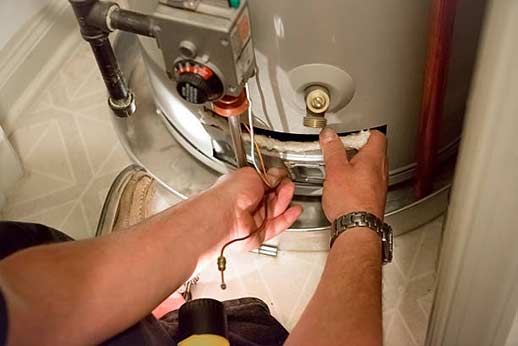
Your water heater makes your life easier by giving you a steady hot water supply for washing, bathing, and other household needs. Most times, the water heater will do this job without any fuss. But sometimes your water will stop working suddenly and for no reason.
The impact of a water heater malfunction often depends on when and how it happens. If the water heater stops working in the middle of winter, the American Heritage Properties Management team warns that the problem can be life-threatening. That is also true if your water heater tank explodes.
What are the different issues that can lead a water heater to stop working, and how can you solve the problems? These are the questions we will be answering in this post.
6 common water heater issues, their causes, and solutions
Inconsistent water temperature
That is when the water heater doesn’t heat water to the same temperature every time despite the thermostat setting being the same.
Causes and solutions: The problem usually stems from the thermostat or heating element. A heating element that is about to fail will not heat water to the desired temperature. The thermostat settings could also be wrong, or the water heater might be disconnected from power. Another probable cause of the problem is a faulty high-temperature cutoff. In some situations, sediment buildup inside the tank will interfere with a water heater’s function. Flushing the tank can solve this problem. If that doesn’t work, you need the help of an expert.
The water heater is leaking
No water heater problem has the power to damage your home like a leak. If the leak is not discovered on time, it can destroy the flooring, insulation and drywall around the water heater.
Causes and solutions: Water heater leaks happen due to a corroded tank, faulty valves (perhaps a temperature and pressure relief (TPR) valve) or loose pipe connections. A faulty TPR valve is easily replaced. If the problem is from a pipe connection, that too can be solved easily. The real problem is when the leak is caused by a corroded tank. The only way to fix a leaky water heater tank is to replace it.
Your energy bill is too high
A malfunctioning water heater can cause huge spikes in your home’s energy bill. That comes due to excessive heat loss from the water heater tank. The problem will force the water heater to re-heat the water inside the tank more frequently, overworking it.
Causes and solutions: The root cause of this problem is when the tank insulation is degraded or subpar. Your energy bills will also be high if you have an oversized water heater. The water heater will waste energy heating water that will not be used.
Low water pressure
If a water heater has lost pressure, the flow of water from your hot water line will be reduced to a trickle. This problem is common in areas with hard water.
Causes and solutions: It is mostly caused by sediment buildup inside the tank. Due to the high level of dissolved minerals inside hard water, it can predispose the home’s water heater tank to clogging. Sediment buildup will also narrow pipe internal diameters and limit their ability to supply water. Problems of low water pressure may also be due to using the wrong size of pipes in the plumbing. If you think there is sediment inside your tank, the best option is to flush it.
Water is discolored or smelly
Sometimes, the water coming from your water heater will acquire a strange color or odor. This can make your home’s hot water supply unfit for bathing, laundry or dishwashing.
Causes and solutions: A used-up anode rod or rust inside the tank can give your water a strange color. Solving the first problem is as simple as replacing the anode rod. But if the problem is caused by rust and corrosion, you may have to replace your water heater. Bad odors from a water heater mean there is bacterial growth inside the tank. That happens when the water heater is not properly maintained, or it has been switched off for a long time. To solve the problem, you should talk to an expert.
The water heater tank is making strange noises
It is normal for a water heater to make some noise when it is working, but these sounds should not be loud enough to be considered noisy.
Causes and solutions: If your water heater is noisy – rumbling, banging or popping– it is because of scaling inside the tank and on the heating elements. You can stop these noises by de-scaling the tank. Whistling sounds from a water heater happens when a valve is faulty. To stop the whistling, change the valve.
Which of these water heater problems are you experiencing in your home? Did you know you can prevent most water heater issues by having a local plumber inspect and maintain your water heater on a schedule? Don’t delay and contact a reliable plumber to check your water heater.

